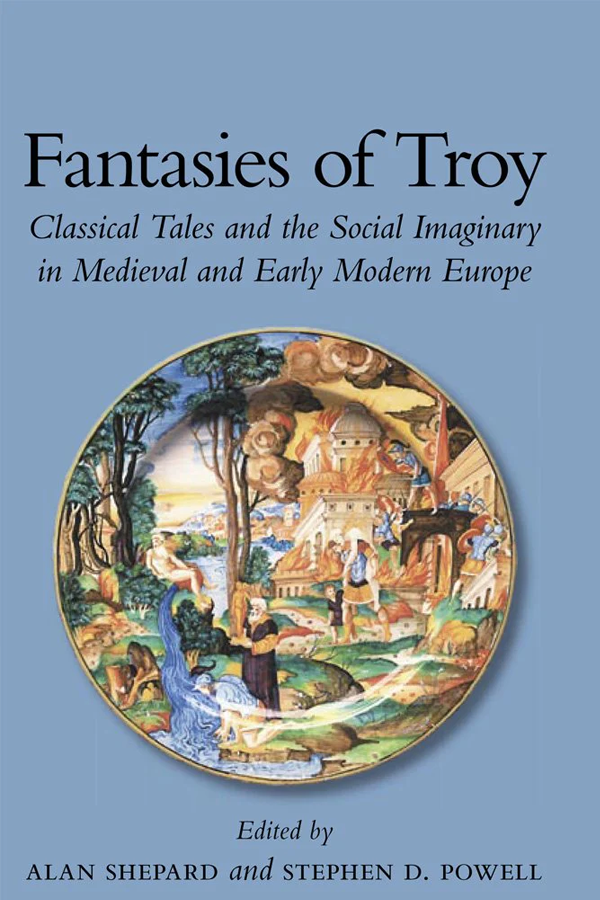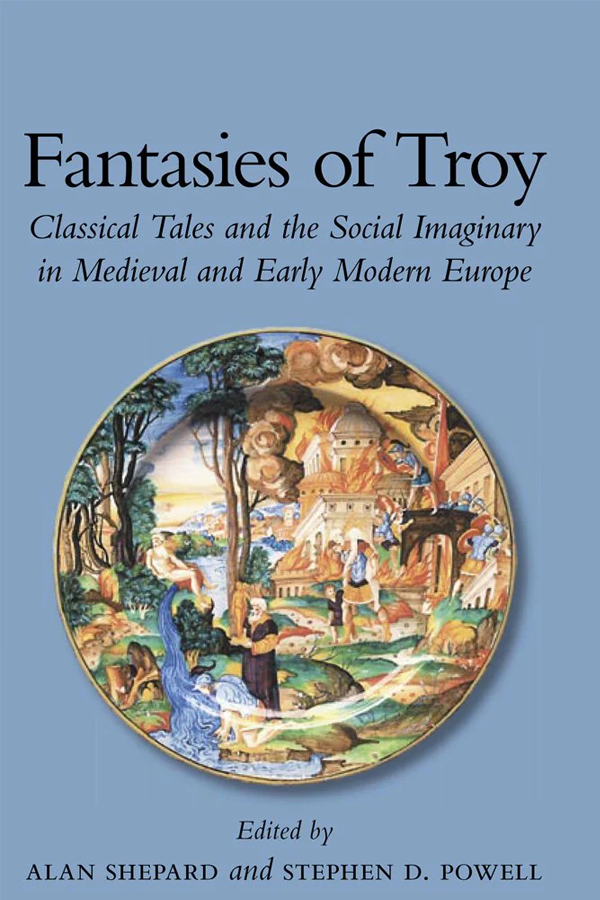Fantasies of Troy: Classical Tales and the Social Imaginary in Medieval and Early Modern Europe
Edited by Alan Shepard and Stephen Powell - ES05
Overview
For medieval and early modern Europeans, contemporary culture was often refracted through the legend of Troy, arguably the most important set of stories outside the Bible for centuries of western European history. These stories were transmitted in dozens of competing versions, and contemporary local events were habitually understood in the context of a pagan legend whose origins were remote and whose mandate was ambiguous.
The fifteen essays in this volume offer compelling new treatments of these now-evaporated fantasies of Troy, which were central to the European social imaginary. The essays consider texts and performances of Troy across a wide generic range-from learned court poetry to burlesque, from treatises on linguistic history to public spectacles.
Fantasies of Troy is bound together by curiosity about stories told and retold by medieval and early modern writers. Their stories contributed for centuries to the constitution of the social imaginaries of several countries, each country understanding itself to be destined for greatness without end, each relying on the cultural practices of storytelling to help make it so, and each gradually leaving the Trojan myths behind.
Alan Shepard is Professor in the School of English and Theatre Studies at the University of Guelph. Marlowe’s Soldiers: Rhetorics of Masculinity in the Age of the Armada, his study of late sixteenth-century London theatre, the rhetoric of national security, and the narratives of empire, appeared in 2002.
Stephen D. Powell is Associate Professor of English at the University of Guelph. Among his publications are articles about medieval romance and the editing of Chaucer.
306 pp.
ISBN: 0-7727-2025-8 softcover
Published: 2004
Contents
Acknowledgements
1. Alan Shepard and Stephen D. Powell, “Introduction”
Affiliation and Appropriation
2. James Carscallen, “How Troy Came to Spenser”
3. Michael Keefer, “‘Fairer than the evening air’: Marlowe’s Gnostic Helen of Troy and the Tropes of Belatedness and Historical Mediation”
4. Paul Cohen, “In Search of the Trojan Origins of French: The Uses of History in the Elevation of the Vernacular in Early Modern France”
5. Brent Miles, “Togail Troí: The Irish Destruction of Troy on the Cusp of the Renaissance”
6. Sheila Das, “The Disappearance of the Trojan Legend in the Historiography of Venice”
Rhetoric, Translatio, Imperii, and Trojan Legacy
7. Pamela Luff Troyer, “Smiting High Culture in the ‘Fondement’: The Seege of Troye as Medieval Burlesque”
8. Lorna Jane Abray, “Imagining the Masculine: Christine de Pizan’s Hector, Prince of Troy”
9. Stéphanie Bélanger, “La Troade de Garnier: destins malheureux et exemples héroïques”
10. Andrew Hiscock, “‘What’s Hecuba to him…’: Trojan Heroes and Rhetorical Selves in Shakespeare’s Hamlet“
11. Stephen Guy-Bray, “Embracing Troy: Surrey’s Aeneid“
12. Christopher Johnson, “Appropriating Troy: Ekphrasis in Shakespeare’s The Rape of Lucrece“
Exemplarity in Troynovant
13. Elizabeth Jane Bellamy, “Slanderous Troys: Between Fame and Rumor”
14. Rebeca Helfer, “Falling Into History: Trials of Empire in Spenser’s Faerie Queene“
15. Scott Schofield, “According to ‘the common received opinion’: Munday’s Brute in The Triumphes of Re-United Britannia (1605)”
16. Michael Ullyot, “The Fall of Troynovant: Exemplarity after the Death of Henry, Prince of Wales”
Reviews
The Sixteenth Century Journal, 38:2 (Summer 2007), pp. 512-513. Reviewed by Audrey DeLong.
University of Toronto Quarterly, 76:1 (Winter 2007), pp. 377-378. Reviewed by Lawrence Manley.
CLIO, 35:2 (Spring 2006), pp. 270-275, 307. Reviewed by John Watkins.
Renaissance Quarterly, 58:4 (Winter 2005), pp. 1386-1387. Reviewed by Jennifer Richards.
English Studies in Canada, 34:4 (December 2005), pp. 240-243. Reviewed by Lauren Kiefer.
Couldn't load pickup availability


